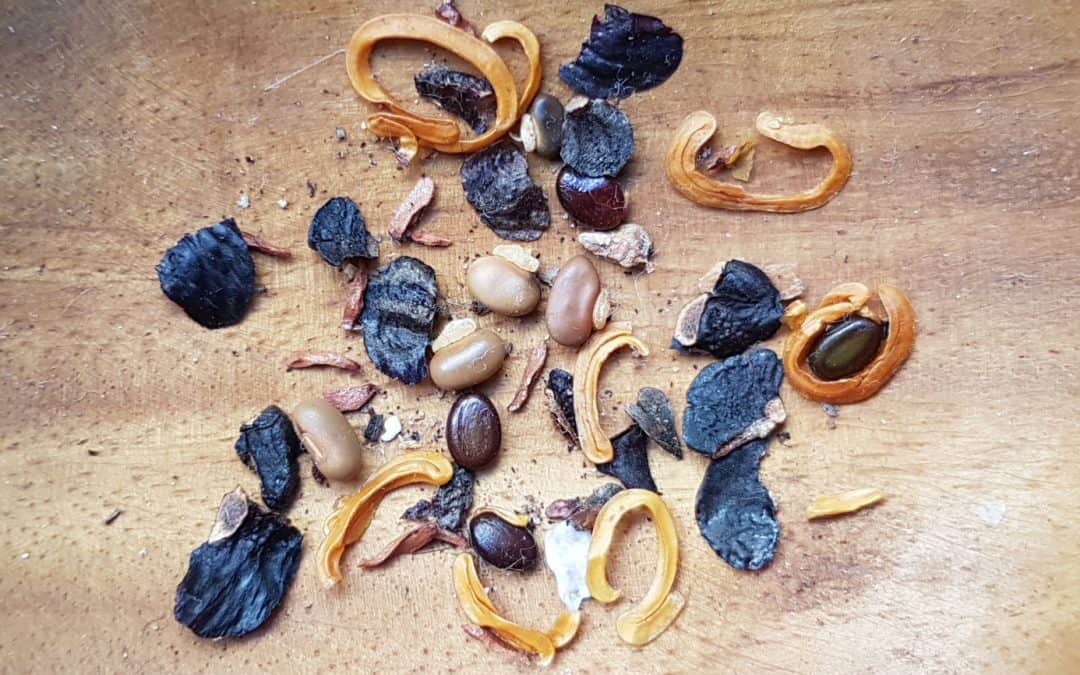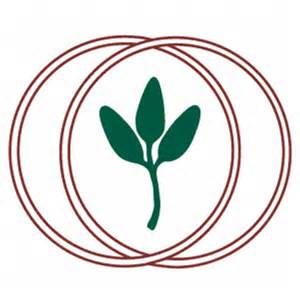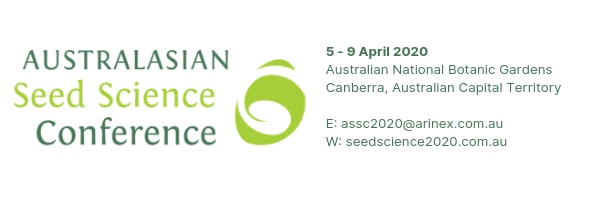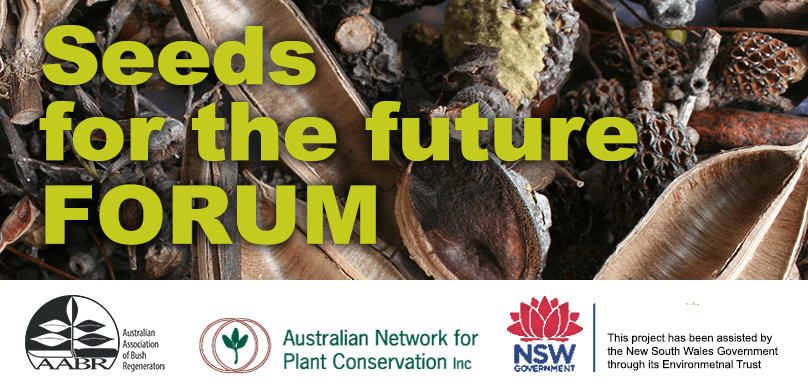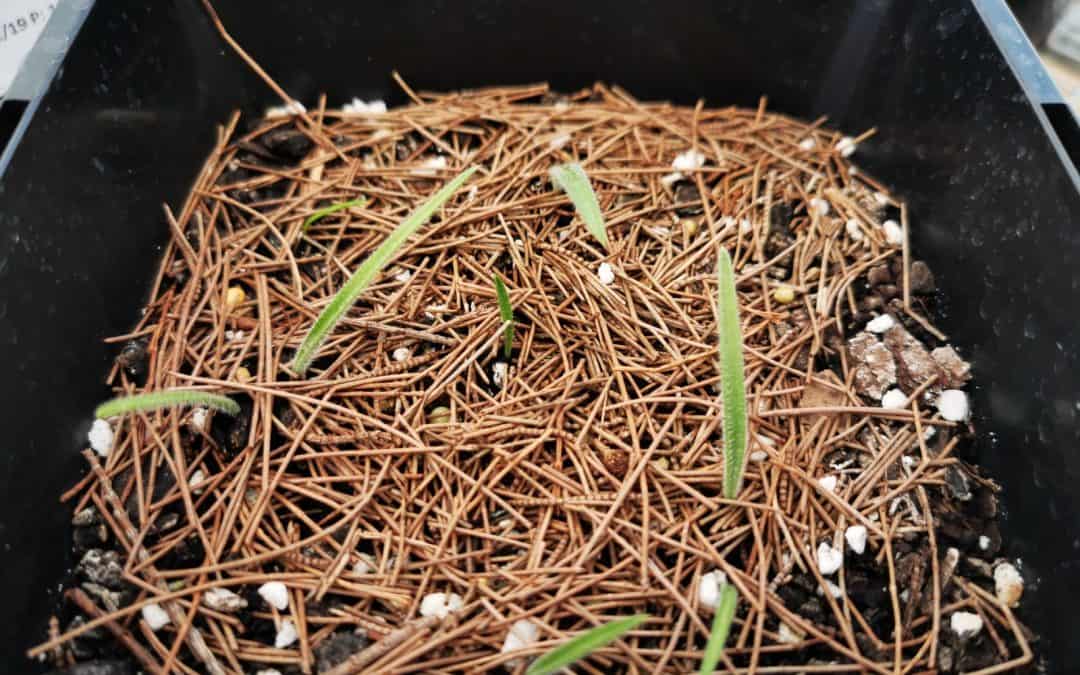
Sep 30, 2019 | News
We are very excited to announce that the ANPC has embarked on the 18 month ‘Healthy Seeds’ project funded by the NSW Government through its Environmental Trust, to deliver an evidence-based Roadmap to secure a reliable, genetically-appropriate, native seed supply in NSW for restoration, and to update the Florabank Guidelines for best practice native seed collection and use. An audit and investigation into past and present Seed Production Areas (SPAs) will also be undertaken. A consortium of partners will be established across the native seed and ecological restoration sectors to oversee the project.
SPAs are seen as central to overcoming shortfalls in high quality native seed for ecological restoration, and for improving seed supply reliability, reducing pressure on wild populations, and for improving genetic provenance and diversity to ensure the long-term health and resilience of restored ecosystems. The Florabank Guidelines, first developed in 1999 in partnership between Greening Australia, CSIRO, and Bushcare, will be revised and updated with the latest science. These guidelines remain the benchmark for best practice native seed collection and use in restoration and are widely used by practitioners – the closest thing to an industry standard that is currently available. Read more.

Sep 30, 2019 | News
The forum is only one week away, the tickets are moving quickly, the line up is impressive and the forum outcomes are ambitious! A gathering of seed specialists, and those dependent upon them for restoration outcomes will be reflecting on the state of the industry and asking ‘Where will the seeds for the future come from?’ The keynote address ‘Restoration in the context of Offsetting’ will be delivered by Dr Ascelin Gordon from RMIT University. Using examples from the restoration of Cumberland Plain Woodland, Dr Gordon will discuss the uncertainties involved in restoration, and what this could mean in terms of offsetting, multipliers, and the scale required to produce resilient offsetting outcomes. The grey-matter will then be engaged throughout the morning session where thought-provoking discussions will be led by experts in the fields of restoration, seed provenance, seed production and offset planning.
How do we achieve an overwhelming net gain with offsets? We have proven technical ability; we have national and international standards (Tein McDonald) but none of these are of any value without the commitment by governments and an understanding of risk management in this field (Greg Steenbeeke). Who is planning the protocols to ensure genetic integrity and enduring seed supply? Are community seed collectors ‘criminals with a cause’ (Paul Gibson-Roy), or the helping hands needed to harness a diverse and difficult task (Maree Whelan)? What is the Seed Supply chain (Martin Driver) and can we develop a Roadmap for the future? Ticket prices range from $20 to $130 (discounts for AABR and ANPC Members, Concession and Students). Read more and purchase tickets here.

Sep 30, 2019 | News
Dr Si-Chong Chen and Dr Elinor Breman, both from the Millennium Seed Bank of the Royal Botanic Gardens Kew, UK, will be delivering keynotes at the conference. Delegates will have the opportunity to meet and share ideas and attend workshops with leading experts, focusing on the importance of seed science to the future of plant conservation and food security. The ANPC is proud to be collaborating with the Australian Seed Bank Partnership on this conference which will be hosted by the Australian National Botanic Gardens and held at Kambri, Australian National University 5-9 April 2020, with the following themes:
- Seed biology and evolutionary ecology – Unlocking the challenges of germination, dormancy and seed ecology in a changing world.
- Seed sourcing and end-use – Considering genetic diversity, restoration and translocations as well as sector specific approaches to seed conservation and use.
- Seed and gene bank management – The ins and outs of managing ex situ seed banks and gene banks and the methods for maximising seed quality and longevity.
- Seeds in culture and society – Sharing stories and learning about cultural seed use, including collaborations between traditional use and ex situ seed banks and gene banks.
Call for abstracts will be opening soon! Visit the website and sign up to received more information as the conference program develops.

Sep 5, 2019 | News
Early-bird price available until 15 September. Whether you’re involved in planting 20 trees in a fragmented urban remnant or 2 million for a biodiversity offset, having access to a sufficient quantity of high-quality seed, from a broad range of species, is essential for restoring ecosystems that are healthy and resilient over the long-term. Given development pressures, climate change and declining space for connectivity across the Greater Sydney Basin and beyond, there is an increasing need for restorationists, plant producers and landscape architects to collaborate on ensuring natives of the correct provenance and genetics are conserved as well as planted within urban spaces. The Seeds for the Future forum will bring together people from the bush regeneration, revegetation, nursery and landscape architecture sectors to set the scene for future collaborations and introduces the insightful ‘Healthy Seeds’ project that is poised to offer practical solutions for all players. Ticket prices range from $20 to $130 (discounts for AABR and ANPC Members, Concession and Students). Sponsorship opportunities are also available! Read more and purchase tickets here.

Sep 5, 2019 | News
The ANPC is working with Royal Botanic Gardens Victoria,Friends of Grampians Gariwerd – FOGGS and Australasian Native Orchid Society – Victorian Group to save the threatened Caladenia audasii from extinction, thanks to funding from the Department of Environment, Land, Water and Planning. Caladenia audasii has fewer than 8 plants left in the wild. So far, an exclusion fence has been constructed at one site to protect newly discovered plants from grazing, seed has been collected and sown for propagation, and plant surveys and pollinator baiting have been undertaken. In spring 2019 there will be more pollinator baiting and surveys for any new plants, before re-introducing 50 seedlings in winter 2020. Read more.
